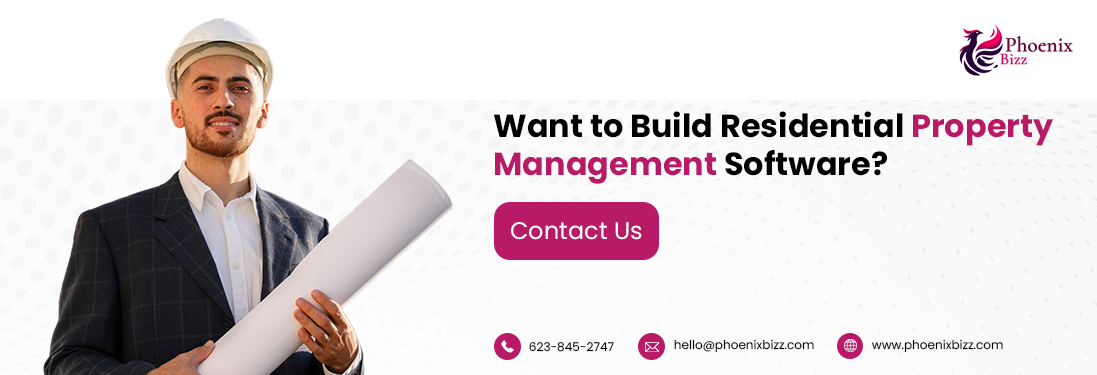June 05, 2024
By: PhoenixBizz Staff Writer
PhoenixBizz is a division of Sofvue, LLC
Printed with permission of Data Titan and Sofvue LLC
Residential property management is a complex endeavor. Property managers, real estate agents, and landlords often handle numerous tasks manually, tasks that could be efficiently automated with the right technology. Software development has demonstrated its value across all industries, from enhancing healthcare accessibility to streamlining e-commerce operations. Various types of software are now simplifying work processes.
Traditional methods of residential property management are time-consuming and susceptible to errors. However, these challenges can be mitigated by investing in residential property management software. Tasks such as collecting rents, sending invoices, tracking maintenance requests, and managing lease renewals should not be done manually when software solutions are readily available.
Are you a residential property manager seeking detailed insights on how software can revolutionize your business? If so, this guide is exactly what you need. This blog delves into how software development transforms residential property management, which software options are optimal for your needs, and much more.
Daily Property Manager Tasks
A property manager's responsibilities encompass overseeing multiple operations within a residential area. These duties include:
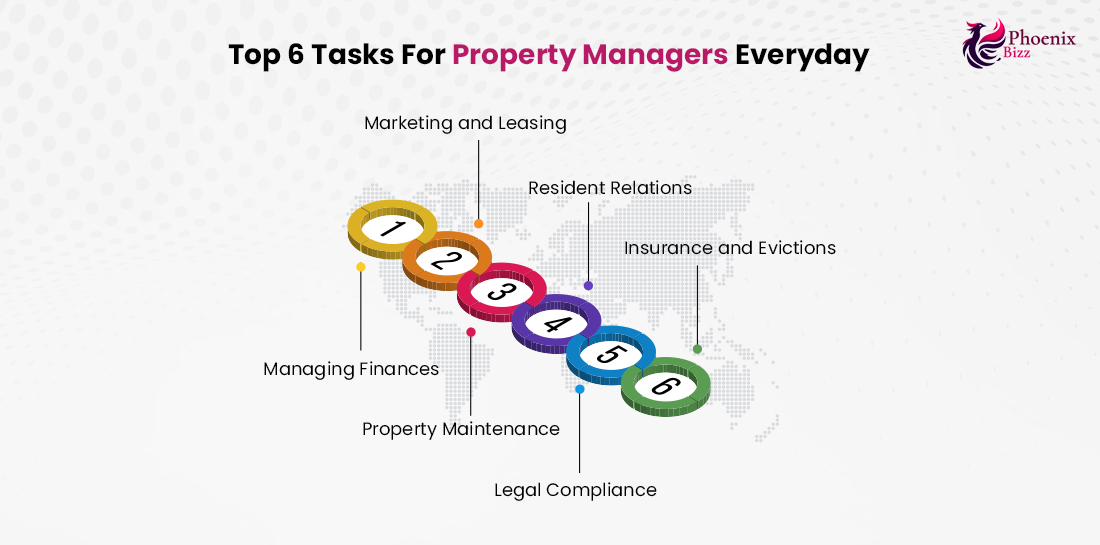
#1. Managing Finances
This includes tasks such as rent collection, accounting, budgeting, and bill payment.
#2. Marketing and Leasing
Property managers are responsible for marketing vacant units to attract potential buyers or tenants, conducting tenant screenings, and handling other leasing-related tasks.
#3. Property Maintenance
Ensuring that the property is well-maintained and that all necessary repairs are completed promptly.
#4. Resident Relations
Building and maintaining positive relationships with residents through swift and consistent communication.
#5. Legal Compliance
Ensuring adherence to all legal regulations related to property management.
#6. Insurance and Evictions
Maintaining appropriate insurance coverage and handling evictions when necessary.
You may also like to read: How To Develop A Real Estate Mobile App For Your Real Estate Brokerage Firm
Ways Property Management Software Can Help
A report by Grand View Research projects the value of the global property management software industry in 2022 to be $4473.3 million and is expected to grow at a compound annual growth rate (CAGR) of 8.1% from 2023 to 2030. The increasing number of residential property managers investing in software highlights its importance. If your work involves managing residential properties, here are several ways software can be your ultimate solution:
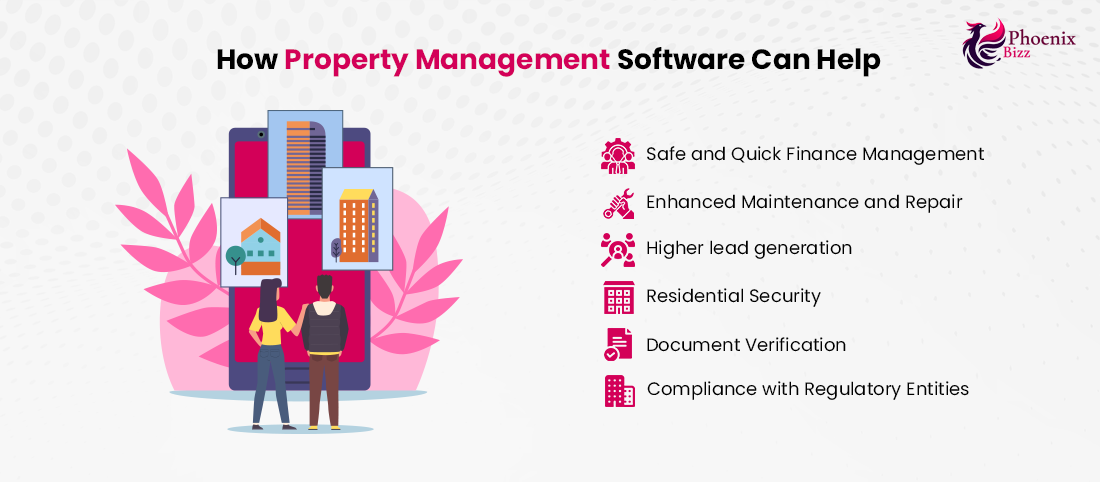
1. Safe and Quick Finance Management
Software can streamline your financial management tasks by automating several functions, such as:
➤ Automatic Bill Payment: Prevent overdue payment penalties by automating bill payments.
➤ Online Rent Collection: Simplify rent collection by enabling online payments.
In addition to these tasks, software can help automate the following aspects:
➤ Expense Tracking: Keep a precise record of all expenses.
➤ Budget Allocation: Ensure proper distribution and use of budgeted funds.
➤ Maintenance and Repair Costs: Track and manage costs related to property maintenance and repairs.
➤ Tax Preparation and Filing: Facilitate timely and accurate tax preparation and filing.
2. Enhanced Maintenance and Repair
Residents expect a pleasant living experience, and as a residential property manager, ensuring timely maintenance and repairs is a key responsibility. Software simplifies this by allowing residents to file complaints online, which are automatically directed to the appropriate department. This leads to quicker resolution without the need for third-party involvement. The software serves as a central platform for all communication between residents and property managers, eliminating miscommunication and delays. Additionally, the software aids in scheduling periodic security checks and inspections.
3. Higher lead generation
Residential property management software is a crucial tool for attracting more potential clients by simplifying processes and improving client interaction. These platforms enable property managers to market listings through various channels, such as websites and social media, reaching a broader audience. The software facilitates timely responses to inquiries, ensuring every lead receives proper attention. Moreover, automation streamlines the lead management process from initial contact to conversion, enhancing productivity and maximizing the chances of securing new tenants. Overall, residential property management software is recognized as an effective strategy for generating and converting leads, driving business growth.
4. Residential Security
Residential property management software is essential for enhancing residential security by providing various tools and features to streamline security processes. These software solutions often include:
◾Access Control Systems: Allows property managers to monitor and control access to the property effectively.
◾Visitor Management: Tracks and manages visitor access.
◾Surveillance Camera Integration: Integrates with surveillance cameras for real-time monitoring.
Additionally, the software can automate tasks such as tenant background checks, maintenance of security devices, and coordination of emergency responses. By centralizing these functions, the software enhances overall security, reduces the risk of unauthorized access, and provides peace of mind to both property owners and residents.
5. Document Verification
In today's digital age, companies aim to go fully online to save time and resources. Residential property management software provides the convenience of online document signing. All paperwork can be digitally completed by assigning signing and approval tasks through the software. This eliminates the need for manual bookkeeping for many residents, tenants, and clients. Additionally, it ensures that all important contact information is readily available when needed.
6. Compliance with Regulatory Entities
A residential property management firm should comply with various regulatory bodies to function in the US. It should maintain the Fair Housing Act, follow various landlord-tenant laws, environmental regulations, and comply with Occupational Safety and Health Administration standards. A Residential Property Management System (RPMS) will assist in ensuring all regulations are followed and the firm complies with the required norms. You will receive timely alerts in case anything is missing, saving you from legal and financial trouble.
What’s New in the Residential Property Management Software Industry?
To operate in the US, a residential property management firm must comply with various regulatory bodies. These include adhering to the Federal Fair Housing Act, various landlord-tenant laws, environmental regulations, and Occupational Safety and Health Administration (OSHA) standards. Residential property management software assists in ensuring compliance with these regulations. The software provides timely alerts if any compliance issues arise, helping to avoid legal and financial troubles.
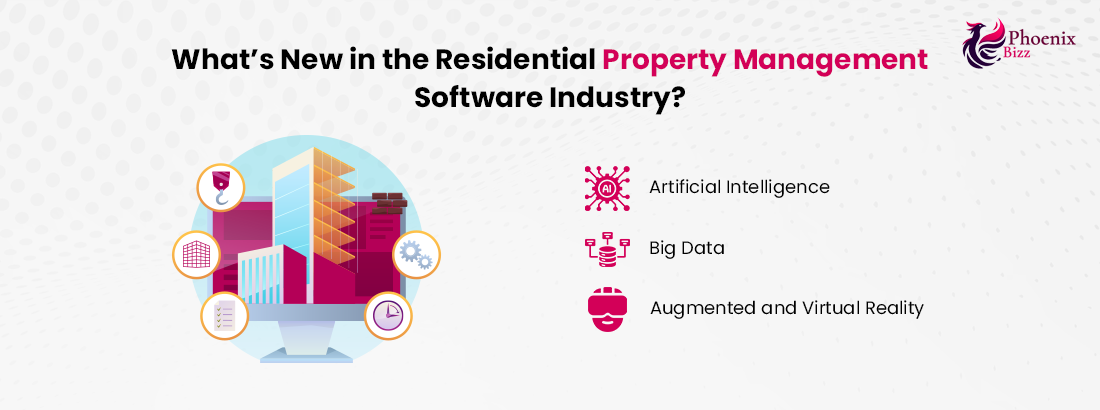
1. Artificial Intelligence
There is hardly an industry today that does not harness the power of artificial intelligence (AI), and the residential property management sector is no exception. Software developers are integrating AI models to enhance and improve Residential Property Management Software (RPMS). Here are a few examples how AI is being utilized:
➔ AI Chatbots: Agents can use AI chatbots to answer general user questions and forward complaints to the appropriate departments. This leads to faster problem resolution and higher client retention.
➔ Fraud Detection and Security: AI integrated into RPMS can detect fraudulent activities, thereby enhancing security measures.
➔ Personalized Recommendations: AI technology can send personalized recommendations for specific services and offerings, boosting resident satisfaction.
2. Big Data
A business flourishes when it gains deeper insights into its operations and client behavior. Big data technology has the potential to revolutionize the residential property management sector by providing valuable insights. Here’s how big data can be beneficial:
➔ Understanding User Behavior: Big data analytics can help property managers understand resident preferences and behaviors, enabling them to tailor services and improve resident satisfaction.
➔ Fraud Detection: By analyzing vast amounts of financial data, big data technology can detect fraudulent activities or payment discrepancies, ensuring financial security and integrity.
➔ Operational Insights: Big data offers detailed information on various operational aspects, allowing for more informed decision-making and efficient management practices.
By harnessing the power of big data, property managers can enhance their operations, ensure financial security, and improve overall client satisfaction.
3. Augmented and Virtual Reality
Augmented Reality (AR) and Virtual Reality (VR) are groundbreaking technologies captivating the world with their capabilities. By integrating AR and VR into residential property management software, property managers can significantly enhance their services. Here are several ways in which AR and VR can be utilized:
➔ Virtual Tours: VR allows property managers to provide virtual tours to clients, tenants, or buyers who cannot visit the site due to geographical barriers. This can expedite the deal conversion process and save time.
➔ Remote Maintenance Support: AR enables residents and tenants to report maintenance issues using the software. They can visually demonstrate the problem, making it easier for property managers to diagnose and address the issue remotely.
By leveraging AR and VR, property managers can offer more interactive and efficient services, improving client experiences and operational efficiency.
Choosing the Right Property Management Software Solution
Selecting the appropriate software for your residential property management business is crucial for enhancing workflow and automating various operations. Since software development requires a significant investment of both time and money, it's essential to choose a solution that aligns with your specific needs. Consider the following factors to make an informed decision:
#1. Business Size
The requirements of a startup varies dramatically from those of a well-established firm. Determine the size and scope of your business before deciding on the software. A startup will need a more scalable and flexible solution, while a larger firm might require more comprehensive features to handle its extensive operations.
#2. Customer or Resident Interaction
Decide if you need the software to interact directly with residents or if a separate mobile app is required. Maintaining smooth and constant communication with residents is vital. Options include integrated communication methods like in-app messaging, SMS, or email. As a property manager, this factor should be a top priority when selecting your software.
#3. Marketing Tasks
Attracting and retaining clients and renters is a key goal for property managers. The right software should assist in managing advertisements, reaching potential leads, and handling various marketing tasks. This includes accessing market analytics and integrating with property search portals to maximize exposure and engagement.
Cost Considerations for Residential Property Management Software
Residential property management software can be a significant investment due to the extensive research and resources required for development. Since software development is complex and relies on advanced technology, different companies may charge varying amounts. Here are key factors to consider when calculating the cost of a residential property management system:
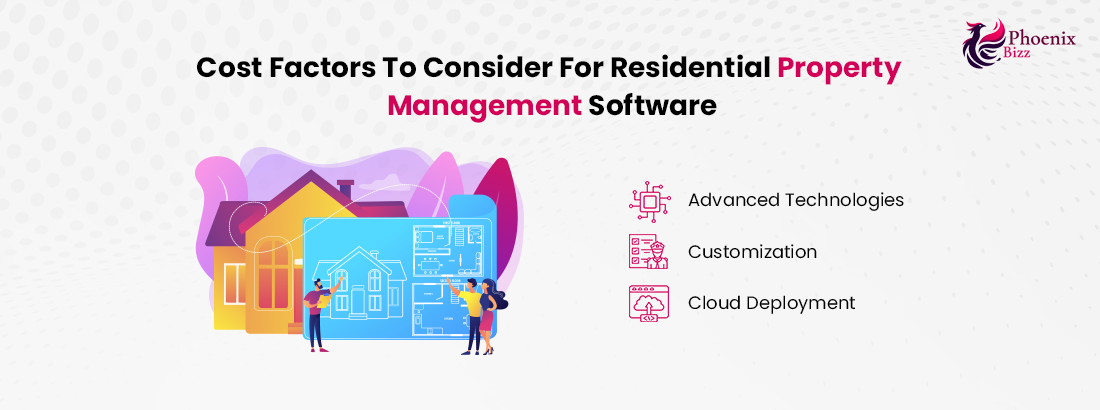
1. Advanced Technologies
1.1 Artificial Intelligence (AI)
Integrating AI can enhance functionalities such as automated responses and predictive analytics, but it also raises development costs.
1.2 Virtual Reality (VR)
Implementing VR for virtual tours and remote inspections can be highly beneficial but is also expensive.
1.3 Data Science
Using data science for analytics and fraud detection adds value but also increases the cost.
Make sure to account for the cost of these advanced technologies when selecting your software.
2. Customization
Customization allows the software to be tailored to your specific business needs, adding significant value to your property management operations.
However, customized features and functionalities come at a higher price.
3. Cloud Deployment
3.1 Additional Costs
Deploying your software on the cloud involves extra expenses, including subscription fees, data storage, and maintenance costs.
3.2 Market Share
According to a report by Grand Review Research, the cloud segment accounted for 60.3% of the total revenue in the property management software market in 2022, highlighting its popularity and significance.
Given the growing reliance on cloud-based solutions, it's important to factor in these costs when planning your software investment. Cloud deployment offers benefits like scalability, remote access, and enhanced data security, which can justify the additional expenses. By considering the costs associated with advanced technologies, customization, and cloud deployment, you can make a well-rounded and informed decision about your residential property management software.
Conclusion
Thriving in the residential property management market without the proper technology tools is a real challenge. Property managers should consider investing in responsive and well-developed property management software to maximize their business’ value. The benefits multiply when cutting-edge technologies are integrated into the software.
If you’re looking for a reliable and professional software development company in Arizona, your search ends with PhoenixBizz. As a division of Sofvue LLC, PhoenixBizz provides expert software development solutions for the real estate industry and be sure to ask us about recently developed applications and mobile apps specifically for the real estate sector. We are a world-class and trusted software partner that delivers highly scalable services to companies across Arizona.
Why PhoenixBizz?
✅ Expert Developers
We offer a wide array of developers and teams for different development stages, ensuring your project is completed by the right people using the right resources.
✅ Client Understanding
We thoroughly undergo rigorous requirement gathering process to ensure our clients’ requirements, so much so that our Project Owners and Project Managers typically take-over all critical development processes, freeing you to focus on other project deliverables.
✅ Constant Communication
We pledge to maintain constant communication with you, ensuring you never miss a single update about the project.
✅ Custom Solutions
Whether you need a custom mobile app or an optimized and advanced software system, we know how to make it happen.
Investing in the right property management software with PhoenixBizz delivers a seamless, professional, and customized experience, helping your business thrive in the competitive market.
Here’s some additional points that make us unique:
➔ Access to state-of-the-art resources
➔ Proficiency in a multitude of front-end and back-end programming language stacks
➔ Attractive and interactive UI/UX designs
➔ A past project portfolio of over 200 projects since 2004
To learn more, contact us at 623-845-2747.
RE: 11796
Citations:
Grand View Research: https://www.grandviewresearch.com/industry-analysis/property-management-software-market
